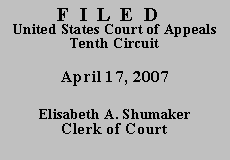

| UNITED STATES OF AMERICA,
Plaintiff-Appellee, |
|
| v. | |
| DIANE LENORE GRIFFITH,
Defendant-Appellant. |
|
Following a jury trial, Griffith was found guilty of conspiracy and wire fraud. United States v. Dazey, 403 F.3d 1147, 1159 (10th Cir. 2005). This court affirmed Griffith's convictions on direct appeal. Id. at 1179. Griffith then filed the instant § 2255 motion, asserting her convictions were void ab initio because the district court lacked jurisdiction to try her and her trial did not comport with the Speedy Trial Act, 18 U.S.C. § 3161, et seq. The district court denied Griffith's § 2255 motion, concluding as follows: (1) it had jurisdiction to try the charges against Griffith pursuant to 18 U.S.C. § 3231; (2) Griffith's jurisdictional challenge was, in essence, a disguised challenge to the sufficiency of the evidence supporting her convictions, challenges already rejected by this court on direct appeal; (3) Griffith was procedurally barred from raising a claim under the Speedy Trial Act because she had failed to raise such a claim on direct appeal.
The granting of a COA is a jurisdictional prerequisite to Griffith's appeal from the denial of her § 2255 motion. Miller-El v. Cockrell, 537 U.S. 322, 336 (2003). To be entitled to a COA, Griffith must make "a substantial showing of the denial of a constitutional right." 28 U.S.C. § 2253(c)(2). To make the requisite showing, she must demonstrate "reasonable jurists could debate whether (or, for that matter, agree that) the petition should have been resolved in a different manner or that the issues presented were adequate to deserve encouragement to proceed further." Id. (quotations omitted). In evaluating whether Griffith has satisfied her burden, this court undertakes "a preliminary, though not definitive, consideration of the [legal] framework" applicable to each of her claims. Id. at 338. Although Griffith need not demonstrate her appeal will succeed to be entitled to a COA, she must "prove something more than the absence of frivolity or the existence of mere good faith." Id.
Having undertaken a review of Griffith's voluminous appellate filings, the district court's order, and the entire record before this court pursuant to the framework set out by the Supreme Court in Miller-El, we conclude Griffith is not entitled to a COA. The district court's resolution of Griffith's § 2255 motion is not reasonably subject to debate and the issues she seeks to raise on appeal are not adequate to deserve further proceedings. Griffith's claims regarding the jurisdiction of the district court to try the charges against her are, to say the very least, fanciful and frivolous. Accordingly, this court DENIES Griffith's request for a COA and DISMISSES this appeal. Griffith's motion to proceed on appeal in forma pauperis; "Motion to disqualify the entire 1st, 2nd, 3rd, 4th, 5th, 6th, 7th, 8th, 9th, 10th, 11th, and District of Columbia Circuits for Cause: racketeering"; and Motion for Release on Bond Pending Appeal are likewise DENIED.
Entered for the Court
Elisabeth A. Shumaker, Clerk
By:
Deputy Clerk